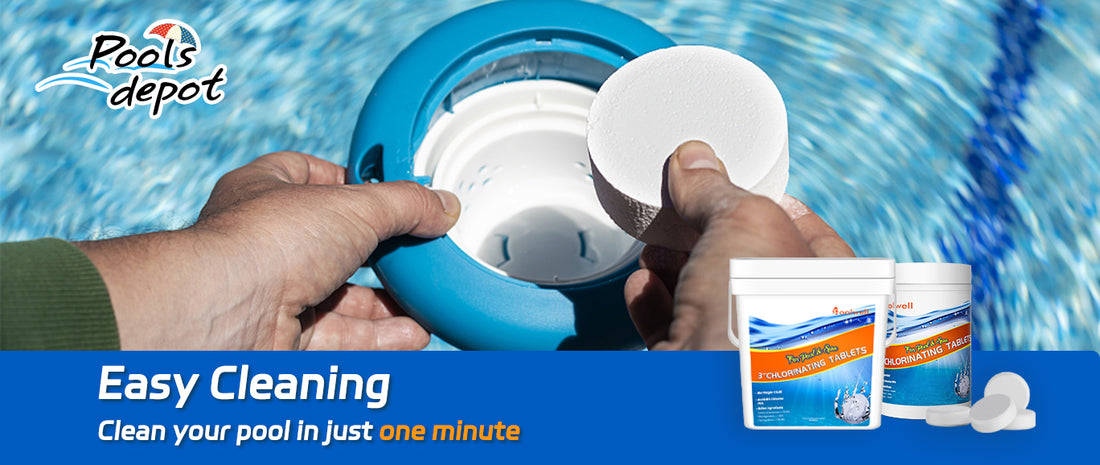
The Ultimate Power of Chlorine Tablets Revealed
Share
“Pure Water, Pure Life: Trust Chlorine Tablets for Crystal Clear Pools”
Introduction
Chlorine tablets are a widely used chemical compound primarily employed for water disinfection and sanitation purposes. These tablets, typically composed of compounds such as trichloroisocyanuric acid or sodium dichloroisocyanurate, release chlorine when dissolved in water. The chlorine acts as a potent oxidizing agent, effectively eliminating harmful bacteria, viruses, and other pathogens, making the water safe for human consumption and use. Chlorine tablets are commonly utilized in swimming pools, drinking water treatment, and various industrial applications due to their convenience, stability, and efficacy in maintaining hygienic conditions.
Safety Tips For Handling Chlorine Tablets
Chlorine tablets are a common and effective means of maintaining clean and safe swimming pool water. However, handling these tablets requires careful attention to safety protocols to prevent accidents and health hazards. Understanding the proper methods for storing, using, and disposing of chlorine tablets is essential for ensuring both personal safety and the well-being of others.
First and foremost, it is crucial to store chlorine tablets in a cool, dry, and well-ventilated area. Exposure to heat and moisture can cause the tablets to degrade or even react dangerously. Therefore, keeping them in their original, tightly sealed container is advisable. Additionally, the storage area should be out of reach of children and pets to prevent accidental ingestion or contact. It is also important to avoid storing chlorine tablets near other chemicals, particularly those that are flammable or reactive, as this can lead to hazardous situations.
Click here to find chlorine tablets perfect for your pool!
When handling chlorine tablets, wearing appropriate personal protective equipment (PPE) is essential. This includes gloves, goggles, and a mask to protect against skin contact, eye irritation, and inhalation of fumes. Chlorine is a potent chemical that can cause severe burns and respiratory issues if mishandled. Therefore, taking these precautions can significantly reduce the risk of injury.
In the event of accidental exposure to chlorine tablets, it is important to act quickly. If skin contact occurs, rinse the affected area with plenty of water for at least 15 minutes. In case of eye contact, flush the eyes with water for the same duration and seek medical attention immediately. If inhaled, move to an area with fresh air and seek medical help if breathing difficulties arise. For ingestion, do not induce vomiting; instead, drink water and contact a poison control center or seek emergency medical assistance.
By adhering to these safety tips, individuals can effectively manage chlorine tablets while minimizing the risks associated with their use. Proper storage, handling, and disposal, along with prompt action in case of accidents, are key components of maintaining a safe and healthy swimming environment. Through diligent adherence to these guidelines, the benefits of chlorine tablets can be enjoyed without compromising safety.
Comparing Chlorine Tablets To Other Pool Sanitizers
When it comes to maintaining a clean and safe swimming pool, choosing the right sanitizer is crucial. Chlorine tablets are a popular choice among pool owners, but it is essential to compare them with other available sanitizers to make an informed decision. Chlorine tablets, known for their convenience and effectiveness, are often favored for their ease of use. They dissolve slowly, providing a steady release of chlorine, which helps maintain consistent levels of sanitation. This slow dissolution is particularly advantageous for pool owners who prefer a low-maintenance approach, as it reduces the frequency of manual dosing.
In contrast, liquid chlorine, another common sanitizer, requires more frequent application. While liquid chlorine is effective in quickly raising chlorine levels, it can be cumbersome to handle and store. Additionally, it tends to degrade faster when exposed to sunlight, necessitating more frequent additions to the pool. This can be a significant drawback for those seeking a more hands-off approach to pool maintenance. Furthermore, liquid chlorine can cause fluctuations in pH levels, requiring additional chemicals to balance the water chemistry.
Another alternative to chlorine tablets is granular chlorine. Granular chlorine is known for its rapid dissolution and immediate effectiveness. It is particularly useful for shock treatments, where a quick boost in chlorine levels is needed to address contamination or algae growth. However, like liquid chlorine, granular chlorine requires careful handling and precise measurement. It can also lead to inconsistent chlorine levels if not applied correctly, necessitating frequent testing and adjustments.
Bromine is another alternative worth considering. Bromine tablets, like chlorine tablets, dissolve slowly and provide a steady release of sanitizer. Bromine is particularly effective in warmer water and is less likely to produce strong odors compared to chlorine. It also remains effective at higher pH levels, reducing the need for frequent pH adjustments. However, bromine is generally more expensive than chlorine, and its availability can be limited in some regions.
In conclusion, while chlorine tablets offer a balanced combination of convenience and effectiveness, it is essential to weigh the pros and cons of each sanitizer type. By understanding the unique benefits and limitations of each option, pool owners can make an informed decision that best suits their needs and ensures a safe and enjoyable swimming experience.

How To Properly Store Chlorine Tablets For Longevity
Chlorine tablets are a popular and effective means of maintaining clean and safe swimming pool water. However, to ensure their efficacy and longevity, proper storage is essential. Understanding the best practices for storing chlorine tablets can help pool owners maximize their investment and maintain optimal water quality.
First and foremost, it is crucial to store chlorine tablets in a cool, dry place. Exposure to heat and moisture can cause the tablets to degrade more quickly, reducing their effectiveness. A temperature-controlled environment, such as a basement or a dedicated storage room, is ideal. If such a space is not available, a well-ventilated area that remains consistently cool and dry will suffice. It is also advisable to keep the tablets away from direct sunlight, as ultraviolet rays can accelerate the breakdown of chlorine compounds.
In addition to temperature and humidity control, proper containment is vital. Chlorine tablets should be stored in their original, airtight containers whenever possible. These containers are specifically designed to protect the tablets from environmental factors that can compromise their integrity. If the original container is damaged or unavailable, a high-quality, airtight plastic or metal container can serve as an alternative. Ensuring that the container is tightly sealed will prevent moisture from entering and causing the tablets to clump or dissolve prematurely.
Furthermore, it is important to store chlorine tablets away from other chemicals. Chlorine is a reactive substance and can produce dangerous gases or reactions if it comes into contact with incompatible materials. For instance, mixing chlorine with acids or ammonia can result in the release of toxic chlorine gas. To avoid such hazards, designate a separate storage area for chlorine tablets, well away from other pool chemicals, household cleaners, and any flammable substances.
Labeling and organization also play a significant role in the proper storage of chlorine tablets. Clearly label the storage container with the contents and the date of purchase. This practice helps in monitoring the age of the tablets and ensures that older stock is used first, following the first-in, first-out (FIFO) principle. Regularly inspecting the storage area for any signs of damage or contamination can further safeguard the quality of the chlorine tablets.
Moreover, safety precautions should not be overlooked. Always handle chlorine tablets with care, using protective gloves and eyewear to prevent skin and eye irritation. When transferring tablets from one container to another, do so in a well-ventilated area to avoid inhaling any fumes. Additionally, keep the storage area secure and out of reach of children and pets to prevent accidental exposure or ingestion.
In summary, the longevity and effectiveness of chlorine tablets are highly dependent on proper storage practices. By maintaining a cool, dry environment, using airtight containers, segregating from other chemicals, and adhering to safety protocols, pool owners can ensure that their chlorine tablets remain potent and safe for use. These measures not only protect the investment in pool maintenance products but also contribute to a safer and more enjoyable swimming experience.
Benefits Of Using Chlorine Tablets In Pool Maintenance
Chlorine tablets have become a cornerstone in pool maintenance, offering a range of benefits that make them an indispensable tool for pool owners and operators. One of the primary advantages of using chlorine tablets is their effectiveness in sanitizing pool water. Chlorine is a powerful disinfectant that eliminates harmful bacteria, viruses, and other pathogens, ensuring that the water remains safe for swimmers. By consistently using chlorine tablets, pool owners can maintain a hygienic environment, reducing the risk of waterborne illnesses.
In addition to their sanitizing properties, chlorine tablets are also highly convenient. They are designed to dissolve slowly, providing a steady release of chlorine over time. This slow-dissolving feature means that pool owners do not need to add chlorine as frequently, simplifying the maintenance process. The tablets can be placed in a floating dispenser, skimmer basket, or automatic chlorinator, allowing for flexible application methods that suit different pool setups. This convenience is particularly beneficial for those who may not have the time or expertise to manage more complex pool maintenance routines.
Click here to find chlorine tablets perfect for pool!
Moreover, chlorine tablets contribute to maintaining balanced water chemistry. Proper water balance is crucial for the overall health of the pool and its users. Chlorine tablets typically contain stabilizers, such as cyanuric acid, which help protect the chlorine from being rapidly degraded by sunlight. This stabilization ensures that the chlorine remains effective for a longer period, reducing the need for frequent adjustments and additional chemical treatments. Consequently, pool owners can achieve a more stable and manageable water chemistry, which is essential for preventing issues such as algae growth and cloudy water.
Furthermore, chlorine tablets are relatively easy to store and handle. They are typically packaged in sturdy, resealable containers that protect them from moisture and contamination. This packaging ensures that the tablets remain potent and effective until they are needed. The solid form of the tablets also reduces the risk of spills and accidental overuse, which can be a concern with liquid chlorine. By providing a straightforward and safe handling experience, chlorine tablets make pool maintenance more accessible to a wider range of users.
In conclusion, the benefits of using chlorine tablets in pool maintenance are multifaceted. Their effectiveness in sanitizing water, convenience in application, contribution to balanced water chemistry, cost-effectiveness, and ease of storage and handling make them a preferred choice for many pool owners. By incorporating chlorine tablets into their maintenance routine, pool owners can enjoy a cleaner, safer, and more manageable swimming environment. The consistent use of these tablets not only enhances the overall pool experience but also ensures the long-term health and enjoyment of the pool for all users.
Q&A
1. **What are chlorine tablets used for?**
Chlorine tablets are used to disinfect and sanitize swimming pools, hot tubs, and drinking water by killing bacteria, viruses, and other harmful microorganisms.
2. **How long does a chlorine tablet last in a pool?**
A chlorine tablet typically lasts between 3 to 7 days, depending on the size of the tablet, water temperature, and pool usage.
3. **Are chlorine tablets safe for all pool types?**
Chlorine tablets are generally safe for most pool types, including vinyl, fiberglass, and concrete pools, but it’s important to follow manufacturer guidelines to avoid damage.
4. **How should chlorine tablets be stored?**
Chlorine tablets should be stored in a cool, dry, and well-ventilated area, away from direct sunlight and moisture, and in a tightly sealed container to prevent degradation and accidental exposure.
Conclusion
Chlorine tablets are an effective and convenient method for disinfecting water, commonly used in swimming pools and drinking water systems to eliminate harmful bacteria and pathogens. They offer a controlled release of chlorine, ensuring consistent sanitation levels, and are easy to store and handle. However, proper usage and handling are crucial to avoid potential health risks and environmental impact.

